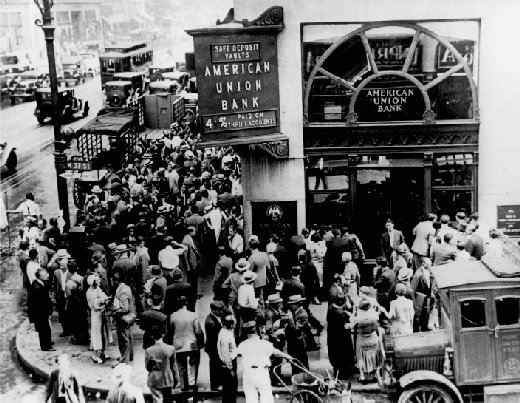Wavepacket Blog displaying only one specific post |
| 2008 | |
| May | |
| Wed May 28 23:05:03 2008 Seizing Up Explained |
|
| >> links >> | |
| Wed May 28 23:05:03 2008 Seizing Up Explained What seizing up really means, and why you should be afraid... |
|
| There was a good story in today's
Wall Street Journal. It covered the last few days of
Bear Stearns' life as a solvent company. It was fascinating reading!
One thing really struck home: the speed of the collapse. Once investors realized Bear Stearns had problems, they rushed to pull out their investments, and banks who were lending them money notified them that their loans wouldn't be renewed. The result? As you'd expect, Bear Stearns ran out of money fast. They couldn't raise the capital necessary to return investor funds, especially since banks were refusing to lend them any more. All they could do was sell their existing securities at fire sale prices to try to pay back investors. This is the classic description of bank runs, even though this was a investment bank rather than a commercial bank. I've written before about the rampant use of the term "seizing up" to describe the post-subprime collapse (see Carpe Seize! or Seizing Up). I was curious, what can they (reporters and financial pontificators) mean by "seizing up?" The WSJ Bear Stearns story is pretty clear: the entire investment bank community was primed to collapse. Investors everywhere would realize "hey, these investments aren't safe at all!", and they would all try to pull their money out at once. Investment firms would not be able to return the funds, because they don't have any. All of your invested money has been used as collateral on loans for the investment banks to make other, bigger investments in an attempt to make high returns. If everyone demanded their money, the firms would be forced to terminate their positions, probably at a loss, in order to close out the loans and return funds. Because all of the investment banks would be selling their securities at the same time in order to raise cash to return to investors, prices would plummet, and the result would be that most of the firms would go under (massive losses amplified by leverage) and most investors would get back only a fraction of what they'd put in. That's what I think "seizing up" means. The house of cards would really collapse. Rather than let that happen, the Federal Reserve moved to keep investment banks solvent. In an unprecendented move, the Fed helped broker a deal whereby JP Morgan would buy Bear Stearns at a huge discount, with the Fed promising to cover all Bear Stearns losses with taxpayer money (see the stories at MSNBC and CNN). I think that is a bad idea. The Fed is trying to cover investment banks with the same guarantees as commercial banks. But that is bound to fail. Why is the Fed's move to protect investment banks ultimately doomed to fail? Because investment banks are competing for the highest rate of returns. The way to achieve high returns is to take on high risk. And that means taking leveraged positions in the market. By attempting to guarantee investment banks, the Fed is putting billions of taxpayer dollars at risk. I say billions, because although the Fed is putting trillions of taxpayer dollars at risk, that is only on paper. A bad crash would bankrupt the country well before we reached the trillion-dollar mark. So what should the Fed do? The Fed should continue to cover and regulate commercial banks. Also, it should only protect commercial banks. Since the 80's, the Fed has let commercial banks take on investment bank responsibilities, especially with the Gramm-Leach-Billey Act, which I'd never heard of before but now looks very suspicious. Once the Fed is back to protecting commercial banks, it should be clear with investors: "If you choose to invest with investment banks, be aware that your deposits are NOT insured, and you could lose all your money." Right now, even a conservative investor is a fool not to invest in risky investment banks. There is no downside. If the bank does well, you make money. If the bank collapses catastrophically, the government will bail you out. So why not take a lot of risk, and let other taxpayers bail you out if needed? If the Fed persists in attempting to cover the risky behavior of investment banks, we'll be fine until the next market crash. Then the result will either be collapse of the economy (unlikely) or the currency (very likely). The currency will collapse as the government realizes it needs to print more money to cover all of the investment bank losses. Comments |
Related: economics Unrelated: books energy environment geopolitics lists mathematics predictions science |
| Links: |  |
Blog Directory | Blog Blog | Technorati Profile | Strange Attractor |

